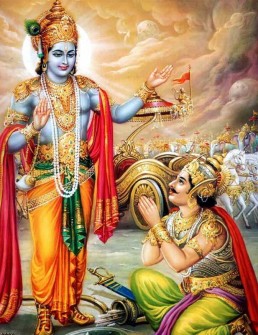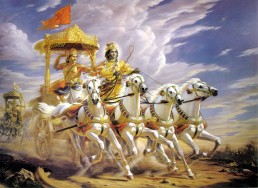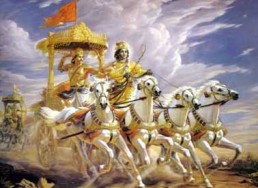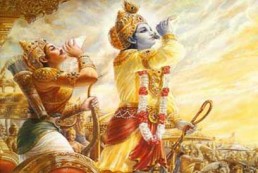Bhagavad Gita-Chapter 12 All Verses with Meaning and Audio
एवं सततयुक्ता ये भक्तास्त्वां पर्युपासते ।
ये चाप्यक्षरमव्यक्तं तेषां के योगवित्तमाः ॥ १२-१॥
evaṃ satatayuktā ye bhaktāstvāṃ paryupāsate
ye cāpyakṣaramavyaktaṃ teṣāṃ ke yogavittamāḥ 12-1
मय्यावेश्य मनो ये मां नित्ययुक्ता उपासते ।
श्रद्धया परयोपेताः ते मे युक्ततमा मताः ॥ १२-२॥
mayyāveśya mano ye māṃ nityayuktā upāsate
śraddhayā parayopetāḥ te me yuktatamā matāḥ 12-2
सर्वत्रगमचिन्त्यञ्च कूटस्थमचलन्ध्रुवम् ॥ १२-३॥
sarvatragamacintyañca kūṭasthamacalandhruvam 12-3
ते प्राप्नुवन्ति मामेव सर्वभूतहिते रताः ॥ १२-४॥
te prāpnuvanti māmeva sarvabhūtahite ratāḥ 12-4
अव्यक्ता हि गतिर्दुःखं देहवद्भिरवाप्यते ॥ १२-५॥
avyaktā hi gatirduḥkhaṃ dehavadbhiravāpyate 12-5
अनन्येनैव योगेन मां ध्यायन्त उपासते ॥ १२-६॥
ananyenaiva yogena māṃ dhyāyanta upāsate 12-6
भवामि नचिरात्पार्थ मय्यावेशितचेतसाम् ॥ १२-७॥
bhavāmi nacirātpārtha mayyāveśitacetasām 12-7
निवसिष्यसि मय्येव अत ऊर्ध्वं न संशयः ॥ १२-८॥
nivasiṣyasi mayyeva ata ūrdhvaṃ na saṃśayaḥ 12-8
अभ्यासयोगेन ततो मामिच्छाप्तुं धनञ्जय ॥ १२-९॥
abhyāsayogena tato māmicchāptuṃ dhanañjaya 12-9
मदर्थमपि कर्माणि कुर्वन्सिद्धिमवाप्स्यसि ॥ १२-१०॥
madarthamapi karmāṇi kurvansiddhimavāpsyasi 12-10
सर्वकर्मफलत्यागं ततः कुरु यतात्मवान् ॥ १२-११॥
sarvakarmaphalatyāgaṃ tataḥ kuru yatātmavān 12-11
ध्यानात्कर्मफलत्यागस्त्यागाच्छान्तिरनन्तरम् ॥ १२-१२॥
dhyānātkarmaphalatyāgas tyāgācchāntiranantaram 12-12
निर्ममो निरहङ्कारः समदुःखसुखः क्षमी ॥ १२-१३॥
nirmamo nirahaṅkāraḥ samaduḥkhasukhaḥ kṣamī 12-13
मय्यर्पितमनोबुद्धिर्यो मद्भक्तः स मे प्रियः ॥ १२-१४॥
mayyarpitamanobuddhiryo madbhaktaḥ sa me priyaḥ 12-14
हर्षामर्षभयोद्वेगैर्मुक्तो यः स च मे प्रियः ॥ १२-१५॥
harṣāmarṣabhayodvegair mukto yaḥ sa ca me priyaḥ 12-15
सर्वारम्भपरित्यागी यो मद्भक्तः स मे प्रियः ॥ १२-१६॥
sarvārambhaparityāgī yo madbhaktaḥ sa me priyaḥ 12-16
शुभाशुभपरित्यागी भक्तिमान्यः स मे प्रियः ॥ १२-१७॥
śubhāśubhaparityāgī bhaktimānyaḥ sa me priyaḥ 12-17
शीतोष्णसुखदुःखेषु समः सङ्गविवर्जितः ॥ १२-१८॥
śītoṣṇasukhaduḥkheṣu samaḥ saṅgavivarjitaḥ 12-18
अनिकेतः स्थिरमतिर्भक्तिमान्मे प्रियो नरः ॥ १२-१९॥
aniketaḥ sthiramatir bhaktimānme priyo naraḥ 12-19
श्रद्दधाना मत्परमा भक्तास्तेऽतीव मे प्रियाः ॥ १२-२०॥
ॐ तत्सदिति श्रीमद्भगवद्गीतासूपनिषत्सु
ब्रह्मविद्यायां योगशास्त्रे श्रीकृष्णार्जुनसंवादे
भक्तियोगो नाम द्वादशोऽध्यायः ॥ १२॥
śraddadhānā matparamā bhaktāste’tīva me priyāḥ 12-20
oṃ tatsaditi śrīmadbhagavadgītāsūpaniṣatsu
brahmavidyāyāṃ yogaśāstre śrīkṛṣṇārjunasaṃvāde
bhaktiyogo nāma dvādaśo’dhyāyaḥ 20

Description
Bhagavad Gita Chapter 12 Summary
Bhakti-yoga – The Yoga of Devotion
The shortest chapter of the Gita but in some ways one of the most important ones because it clearly explains the meaning of a term that is often misunderstood – Bhakti. The Lord succinctly points out the attributes that denote a true Bhakta who is dear to Him, thereby providing us with a list of qualities we must strive to cultivate in ourselves. Below are the main themes of Chapter 12:
Verses 1 – 2
Arjuna’s question and Kṛṣṇa’s answer
Verses 3 – 12
The five stages of bhakti (prasādabuddhi, īśvarārpaṇabuddhi, iṣṭadevatā-upāsanā, virāḍ-upāsanā and akṣara-upāsanā jñā-nayoga)
Verses 13 – 19
Traits of parābhakta (parābaktalakṣaṇa)
Verses 20
Glory of the teaching
Verses 35 – 47
Arjuna’s delusion which stems from his ignorance about the true nature of oneself (moha)
Gita Chapter 12 – Commentary by Swami Paramarthananda
Background
The eleventh chapter has paved the way for virāḍ-bhakti. So, in the twelfth chapter, the Lord deals with all aspects of bhakti leading to liberation.
The chapter begins with Arjuna’s question seeking to know whether virāḍ-bhakta (saguṇabhakta) or akṣara-bhakta (nirguṇa-bhakta) is superior (1).
Lord Krishna first answers that saguṇabhakta is superior. (In fact, we cannot compare them. Everyone has to go through both and one can reach the Lord through nirguṇabhakti alone, which the Lord himself points out in the 4th verse. Still the Lord praises saguṇabhakta because of the context.) (2)
From the 3rd verse to the 12th verse, Krishna gives out the entire range of bhakti which leads to liberation. In the first 3 verses (3 to 5) Krishna talks about nirguṇabhakti which is jñānayoga and which is the direct means for liberation. But, the Lord points out that this would be difficult for unprepared people (5).
From the 6th verse to the 8th verse, the Lord speaks about the next lower stage in the form of virāḍ-upāsanā. He promises that such upāsaka would be rescued from saṃsāra by the Lord. (This does not mean that a virāḍ-upāsaka can get liberation, skipping jñānayoga. The idea is that he becomes fit for jñānayoga and attains liberation through knowledge.)
In the 9th verse, the Lord comes one more step down. If one is incapable of doing virāḍ-upāsana, let him practice meditation on any form of the Lord (iṣṭadevatā-upāsanā). Thus, upāsanā (on virāḍ or iṣṭadevatā) becomes the preparatory step for jñānayoga.
In the next verse (10th), the Lord comes down further. If a person is too extrovert to take up upāsanā, he is asked here to perform his duty (nitya and naimittika) as an offering to the Lord (Īśvarārpaṇam) without expecting any reward.
When a person is full of desires, he is impelled to do desire-born actions (kāmya) expecting results. For such a person Krishna prescribes the last step. When he receives the result of kāmya-karmas, let him take it as a prasāda (graceful gift) of the Lord and avoid reaction. Krishna indicates this through the word ‘sarvakarmaphalatyāgam’ (11).
The above two steps come under karmayoga. (A karmayogī becomes fit for upāsanā after some time. Upāsanā makes him qualified for jñānayoga. Jñāna helps him discover his own true ever-free nature.)
Krishna concludes this topic by praising the last step of karma-yoga (12).
From the 13th verse up to the 19th verse, Krishna gives a clear picture of the characteristics of one who has gone through all these steps and discovered fulfillment. [As a karmayogī and upāsaka he was a devotee of saguṇa-īśvara, seeing the Lord as distinct from him. This is only lower bhakti, because he does not know the true nature of the Lord still (Refer VII-17). His bhakti is saguṇabhakti or bhedabhakti or aparā-bhakti. Once he pursues jñānayoga and discovers his identity with the Lord, his bhakti becomes nirguṇabhakti or abhedabhakti or parā-bhakti, which is an end in itself.] In these verses Krishna describes the traits of a parabhakta who is a sthitaprajña (Refer II-55 to 72). (This serves twofold purpose. Firstly, it is an inspiration for a seeker to pursue his sādhanam. Secondly, the natural traits of a parabhakta serve as values for a sādhaka to be deliberately practised.)
This portion can be broadly divided into two. One referring to those virtues which a parabhakta spontaneously enjoys, and the second, referring to those negative traits which he is totally free from.
Krishna concludes the teaching by saying — “Those who follow this teaching with faith, keeping Me as the goal, are very dear to Me.” (20)
Gita 12th Chapter – Main Points
Arjuna’s question and Krishna’s answer: 1, 2
The five stages of bhakti (prasādabuddhi, īśvarārpaṇabuddhi, iṣṭadevatā-upāsanā, virāḍ-upāsanā and akṣara-upāsanā jñā-nayoga): 3 to 12
Traits of parābhakta (parābaktalakṣaṇa): 13 to 19
Glory of the teaching: 20
Since this chapter talks about all stages of bhakti, this is called ‘Bhakti yoga’
Other Bhagavad Gita Shlokams
Bhagavad Gita
The Bhagavad Gita, or the Song of the Lord, is a dialogue between Krishna, an incarnation of Vishnu, and his friend and disciple, Arjuna. Composed of 701 Shlokas arranged in 18 chapters, the Gita is one of the best-known philosophical texts of…
Bhagavad Gita-Chapter 01 All Verses with Meaning and Audio
Bhagavad Gita Chapter 1 All Verses for easy chanting along with Audio and Meaning. Lyrics In English, Sanskrit, Hindi, Telugu, Tamil, Gujarati, Bengali and many more languages.
Bhagavad Gita-Chapter 02 All Verses with Meaning and Audio
Bhagavad Gita Chapter 2 All Verses for easy chanting along with Audio and Meaning. Lyrics In English, Sanskrit, Hindi, Telugu, Tamil, Gujarati, Bengali and many more languages.
Bhagavad Gita-Chapter 03 All Verses with Meaning and Audio
Bhagavad Gita Chapter 3 All Verses for easy chanting along with Audio and Meaning. Lyrics In English, Sanskrit, Hindi, Telugu, Tamil, Gujarati, Bengali and many more languages.
Bhagavad Gita-Chapter 04 All Verses with Meaning and Audio
Bhagavad Gita Chapter 4 All Verses for easy chanting along with Audio and Meaning. Lyrics In English, Sanskrit, Hindi, Telugu, Tamil, Gujarati, Bengali and many more languages.
Bhagavad Gita-Chapter 05 All Verses with Meaning and Audio
Bhagavad Gita Chapter 5 All Verses for easy chanting along with Audio and Meaning. Lyrics In English, Sanskrit, Hindi, Telugu, Tamil, Gujarati, Bengali and many more languages.
Bhagavad Gita-Chapter 06 All Verses with Meaning and Audio
Bhagavad Gita Chapter 6 All Verses for easy chanting along with Audio and Meaning. Lyrics In English, Sanskrit, Hindi, Telugu, Tamil, Gujarati, Bengali and many more languages.
Bhagavad Gita-Chapter 07 All Verses with Meaning and Audio
Bhagavad Gita Chapter 7 All Verses for easy chanting along with Audio and Meaning. Lyrics In English, Sanskrit, Hindi, Telugu, Tamil, Gujarati, Bengali and many more languages.
Bhagavad Gita-Chapter 08 All Verses with Meaning and Audio
Bhagavad Gita Chapter 8 All Verses for easy chanting along with Audio and Meaning. Lyrics In English, Sanskrit, Hindi, Telugu, Tamil, Gujarati, Bengali and many more languages.
Bhagavad Gita-Chapter 09 All Verses with Meaning and Audio
Bhagavad Gita Chapter 9 All Verses for easy chanting along with Audio and Meaning. Lyrics In English, Sanskrit, Hindi, Telugu, Tamil, Gujarati, Bengali and many more languages.
Bhagavad Gita-Chapter 10 All Verses with Meaning and Audio
Bhagavad Gita Chapter 10 All Verses for easy chanting along with Audio and Meaning. Lyrics In English, Sanskrit, Hindi, Telugu, Tamil, Gujarati, Bengali and many more languages.
Bhagavad Gita-Chapter 11 All Verses with Meaning and Audio
Bhagavad Gita Chapter 11 All Verses for easy chanting along with Audio and Meaning. Lyrics In English, Sanskrit, Hindi, Telugu, Tamil, Gujarati, Bengali and many more languages.
Bhagavad Gita-Chapter 13 All Verses with Meaning and Audio
Bhagavad Gita Chapter 13 All Verses for easy chanting along with Audio and Meaning. Lyrics In English, Sanskrit, Hindi, Telugu, Tamil, Gujarati, Bengali and many more languages.
Bhagavad Gita-Chapter 14 All Verses with Meaning and Audio
Bhagavad Gita Chapter 14 All Verses for easy chanting along with Audio and Meaning. Lyrics In English, Sanskrit, Hindi, Telugu, Tamil, Gujarati, Bengali and many more languages.
Bhagavad Gita-Chapter 15 All Verses with Meaning and Audio
Bhagavad Gita Chapter 15 All Verses for easy chanting along with Audio and Meaning. Lyrics In English, Sanskrit, Hindi, Telugu, Tamil, Gujarati, Bengali and many more languages.
Bhagavad Gita-Chapter 16 All Verses with Meaning and Audio
Bhagavad Gita Chapter 16 All Verses for easy chanting along with Audio and Meaning. Lyrics In English, Sanskrit, Hindi, Telugu, Tamil, Gujarati, Bengali and many more languages.
Bhagavad Gita-Chapter 17 All Verses with Meaning and Audio
Bhagavad Gita Chapter 17 All Verses for easy chanting along with Audio and Meaning. Lyrics In English, Sanskrit, Hindi, Telugu, Tamil, Gujarati, Bengali and many more languages.
Bhagavad Gita-Chapter 18 All Verses with Meaning and Audio
Bhagavad Gita Chapter 18 All Verses for easy chanting along with Audio and Meaning. Lyrics In English, Sanskrit, Hindi, Telugu, Tamil, Gujarati, Bengali and many more languages.
Gita Dhyanam
The Gītā Dhyānam, also called the Gītā Dhyāna or the Dhyāna Ślokas associated with the Gītā, is a 9-verse Sanskrit poem that has often been attached to the Bhagavad Gita, one of the most important scr
Bhagavad Gita-Chapter 12 All Verses with Meaning and Audio – Bhagavad Gita – Bhagavad Gita Chapter 12 All Verses Easy Chanting with Audio and Meaning, Lyrics




